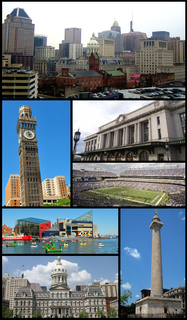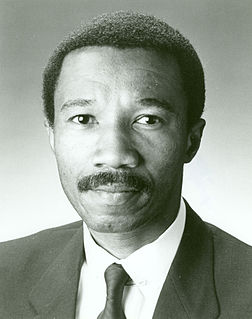
Kweisi Mfume is an American politician and the former President/CEO of the National Association for the Advancement of Colored People (NAACP), as well as a five-term Democratic Congressman from Maryland's 7th congressional district, serving in the 100th through 104th Congress. On September 12, 2006, he lost a primary campaign for the United States Senate seat that was being vacated by Maryland U.S. Senator Paul Sarbanes.

United States gubernatorial elections were held on November 7, 2006 in 36 states and two territories.

The Maryland gubernatorial election of 2006 was held on November 7, 2006. It was a race for the Governor and Lieutenant Governor of Maryland. The winning candidates -- Martin O'Malley and Anthony G. Brown, who defeated the incumbent Gov. Robert Ehrlich and running mate Kristen Cox—were elected to serve from 2007 to 2011.

Jill P. Carter is an American politician who represents Maryland's 41st legislative district of Baltimore City in the Maryland State Senate. She previously represented the same district Maryland House of Delegates. She was elected to the Maryland legislature in 2002 and took office in January 2003, resigning in 2017. She was appointed to the state Senate May 4, 2018. She won the primary election, receiving 54% of the vote, handily defeating Martin O’Malley’s heavily funded son-in-law and former Senator Nathaniel T. Oaks.
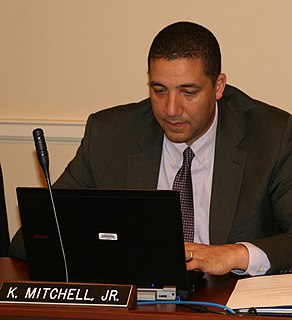
Keiffer Jackson Mitchell Jr. is an American politician from Baltimore, Maryland, who once served in the Maryland House of Delegates and the Baltimore City Council and was a candidate in the 2007 mayoral election.

The Maryland gubernatorial election of 2010 was held on November 2, 2010. The date included the election of the Governor, Lieutenant Governor, and all members of the Maryland General Assembly. Incumbent Governor Martin O'Malley and Lieutenant Governor Anthony G. Brown, both Democrats, were eligible to run for a second term in office and pursued a successful re-election against former governor Bob Ehrlich and his running mate Mary Kane, whom O'Malley had defeated in 2006. O'Malley and Brown became the first gubernatorial ticket in Maryland history to receive more than one million votes.As of 2019, this is the most recent election in which a Democrat was elected Governor of Maryland.

Catherine E. Pugh is an American Democratic politician, currently serving as the 50th mayor of Baltimore City, Maryland. Pugh has been involved in Maryland politics since 1999 when she served on the Baltimore City Council. She has also held office in the Maryland House of Delegates and the Maryland Senate, serving as the Majority Leader from 2015 to 2016. She first ran for Baltimore City mayor in 2011 and lost the primary to Stephanie Rawlings-Blake. Pugh ran again in 2016 and won the primary against former Mayor Sheila Dixon. Pugh then won the mayoral election on November 8, 2016 with 57% of the popular vote, and took office on December 6, 2016. She is Baltimore's third consecutive female mayor.

The 2008 congressional elections in Maryland were held on November 4, 2008 to determine who would represent the state of Maryland in the United States House of Representatives, coinciding with the presidential election. Representatives are elected for two-year terms; those elected serve in the 111th Congress from January 3, 2009 until January 3, 2011.
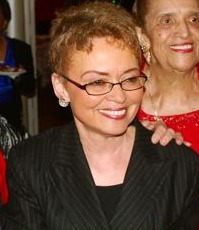
The 1990 Washington, D.C. mayoral election occurred on Tuesday, November 6, 1990, with Democratic candidate Sharon Pratt Dixon defeating Republican Maurice Turner.

The 2010 United States Senate election in Maryland was held on November 2, 2010. Primary elections were held on September 14, 2010. Incumbent Democratic U.S. Senator Barbara Mikulski won re-election to a fifth term.

On November 2, 1999, the city of Baltimore, Maryland, elected a new mayor, the 47th in the city's history. Primary elections were held to determine the nominees for the Democratic Party and Republican Party on September 14. Incumbent mayor Kurt Schmoke, a Democrat, opted not to run for reelection. Martin O'Malley, a member of the Baltimore City Council, won the election to succeed Schmoke.
Joshua Jackson "Josh" Cohen is an American Democratic politician and former mayor of Annapolis, Maryland. Cohen, a Democrat, gained 46.5 percent of the vote to defeat Republican nominee David Cordle and independent candidate Chris Fox in the 2009 mayoral election. Cohen, who served previously on the Anne Arundel County Council and the Annapolis City Council, succeeded Ellen Moyer as Annapolis' chief executive on Dec. 7, 2009.
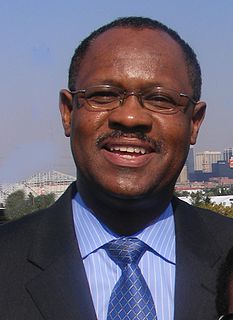
Carl Frank Stokes is an American politician who represents the 12th district on the Baltimore City Council. He is a former member of the Baltimore City Board of school commissioners and ran for Mayor of Baltimore in 1999.
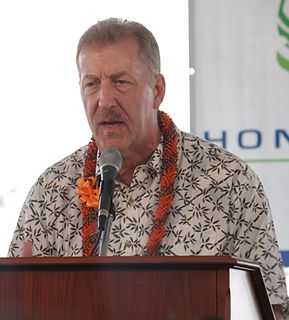
The 2010 Honolulu special mayoral election was held on September 18, 2010. The election coincided with Hawaii's primary election. The winner of the election, Peter Carlisle, filled the unexpired term of former Democratic Honolulu Mayor Mufi Hannemann, who resigned on July 20, 2010 to run in the 2010 election for Governor of Hawaii.

The 2013 Pittsburgh mayoral election took place on November 5, 2013. Democrat Bill Peduto was elected the 60th Mayor of Pittsburgh, Pennsylvania. The primary election was held on May 21, 2013. Incumbent Democratic Mayor Luke Ravenstahl, although eligible for a second full term, did not seek reelection as Mayor of Pittsburgh.

The 2016 United States Senate election in Maryland took place on November 8, 2016, to elect a member of the United States Senate to represent the State of Maryland, concurrently with the 2016 U.S. presidential election, as well as other elections to the United States Senate in other states and elections to the United States House of Representatives and various state and local elections.

The 2016 Baltimore mayoral election was held November 8, 2016 concurrent with the General Election. Stephanie Rawlings-Blake, the incumbent mayor, did not run for reelection. Catherine Pugh won the election on November 8, 2016, with 57% of the popular vote, and took office on December 6, 2016.

The 2018 United States House of Representatives elections in Maryland were held on November 6, 2018, electing the eight U.S. Representatives from the State of Maryland, one from each of the state's eight congressional districts. The elections coincided with the gubernatorial election, as well as other elections to the House of Representatives, elections to the United States Senate and various state and local elections.

